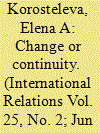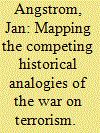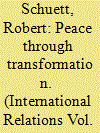|
|
|
Sort Order |
|
|
|
Items / Page
|
|
|
|
|
|
|
| Srl | Item |
| 1 |
ID:
106438


|
|
|
|
|
| Publication |
2011.
|
| Summary/Abstract |
This article examines the discourse of the EU's relations with eastern Europe under the recently launched Eastern Partnership (EaP) initiative. First, it evaluates the EaP's conceptual framework to suggest that there seems to be more continuity than change in the EU's modus operandi with its neighbours. More crucially, the notion of 'partnership', central to the new philosophy of cooperation with the outsiders, continues to be ill defined, causing a number of problems for the effective and legitimate realisation of the European Neighbourhood Policy/Eastern Partnership in the region. Second, drawing on the empirical investigations of the official discourses in Belarus, Ukraine and Moldova, the article reveals an increasing gap between EU rhetoric and east European expectations. In the absence of adequate partnership response to the needs and interests of 'the other', the policy is unlikely to find anticipated legitimation in the neighbourhood.
|
|
|
|
|
|
|
|
|
|
|
|
|
|
|
|
| 2 |
ID:
106425


|
|
|
|
|
| Publication |
2011.
|
| Summary/Abstract |
This article addresses the problem of global norm diffusion in international relations with particular reference to the implementation of 'the responsibility to protect' (R2P) in East Asia. Exposing the limits of previous work on norm localization, we develop the framework of the norm diffusion loop. Rather than understanding norm diffusion as a linear top-down process, we demonstrate that the reception of R2P has evolved in a far more dynamic way that can best be described as a feedback loop. We first look into the processes and causal mechanisms that helped to construct R2P as an emerging transnational soft norm; then we analyse the challenges of diffusing R2P from the global to the regional and domestic levels; and, finally, we examine the variation of norm effects within the same region across states, investigating in particular how R2P has shaped Chinese and Japanese policy responses respectively.
|
|
|
|
|
|
|
|
|
|
|
|
|
|
|
|
| 3 |
ID:
106432


|
|
|
|
|
| Publication |
2011.
|
| Summary/Abstract |
This article maps the historical analogies of the war on terrorism used by the Bush administration. It identifies four historical analogies of the war on terrorism present in the US political and academic discourse since the attacks on 11 September 2001. These are the war on terrorism as: (a) the Second World War; (b) the Crusades; (c) the Vietnam War; and (d) the Cold War. These analogies have been a constant presence in the US discourse, although the analogy with the Crusades has been more prominent in the academic discourse than in the political. There is, moreover, no conclusive pattern of when and how these analogies have been used, suggesting that we cannot use them to evaluate how well the war on terrorism is progressing. This also indicates that the Bush administration, with one exception, was not successful in framing the policy agenda in a certain direction regarding the war on terrorism. Understanding the war on terrorism as a new Cold War, for example, still implies different policy measures such as roll-back and containment.
|
|
|
|
|
|
|
|
|
|
|
|
|
|
|
|
| 4 |
ID:
106423


|
|
|
|
|
| Publication |
2011.
|
| Summary/Abstract |
Transformationalist thinking is plentiful. The Iraq invasion is the latest example of its failure. Is international political reality destined to be the 'realm of recurrence and repetition'? This article delineates a political theory of moderate progress found in Hans Morgenthau's political realism (Realism). Realism recognises the potentiality of transforming international relations, but, warned by its political anthropology, it envisions a distinct philosophy of politics as an effective means for achieving peace. It makes the case for a foreign policy of national security and humility, believing in progress by other means. Based on a renewed engagement with its concepts of the state, national interest and national security, Realism is shown to be critical and progressivist, restrained and realistic. Its nature and structure makes it intellectually incompatible with conservative organicist projects; nor is it reconcilable with radical critical agendas. In search for allies, Realism shows a potential affinity to a moderately Leftist politics and foreign policy.
|
|
|
|
|
|
|
|
|
|
|
|
|
|
|
|
|
|
|
|
|